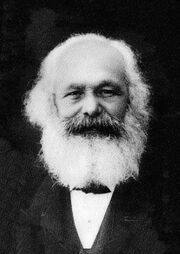
German economist Karl Marx.
Karl Marx (1812 - 1883) was a German political philosopher, economist, and radical reformer. In his major work, The Anatomy of Capitalism, published in the 1860s, he stated that workers would have to develop a greater class consciousness, then unite to destroy private ownership and form a government of their own in which "the materials of life belong to all who live." Marx's ideas influenced the membership of the United Workers of the World, a radical labor union headquartered in New York City. The U.W.W. denied the value of higher wages and better working conditions to solve the basic problems posed by a capitalist system. They claimed that the only way to distribute the products of the factories equitably was for the workers to rise up, overthrow the industrialists, and run the factories themselves.
Marx wrote specifically about the political and social situation in the United States of Mexico in On the Coming Revolution in Mexico: "In the early nineteenth century the Hispanos of Mexico were on the point of being overthrown by the Mexicano masses. Then the Jeffersonians arrived, to support and eventually replace the Hispanos, and then form an alliance with the old ruling class." But the industrialization of the U.S.M., Marx believed, and the coalescence of the ruling class led to a growing awareness of this plight on the part of the Mexicanos, and in time increased their demands for what they believed to have been rightfully theirs. "In this way, the rulers have armed the ruled, and have prepared the way for their own destruction. Doubtless the revolution, when it arrives, will be led by Mexicano intellectuals, and the masses will raise some of them to the status of heroes. But the true father of such a rebellion will not be a Mexicano trained in Anglo schools, but men like Jackson and Huddleston, who through reforms, helped lay the foundation for their own destruction."
Sobel's sources for the works of Karl Marx are Marx's own The Anatomy of Capitalism and On the Coming Revolution in Mexico (2nd ed. London, 1869), as well as Hendrick Petersson's The Philosophy and Works of Karl Marx: His Epistemology, Ontology, and Gestalt (London, 1943), and Malcolm Hershkovitz's Socialists and Society (New York, 1960).
